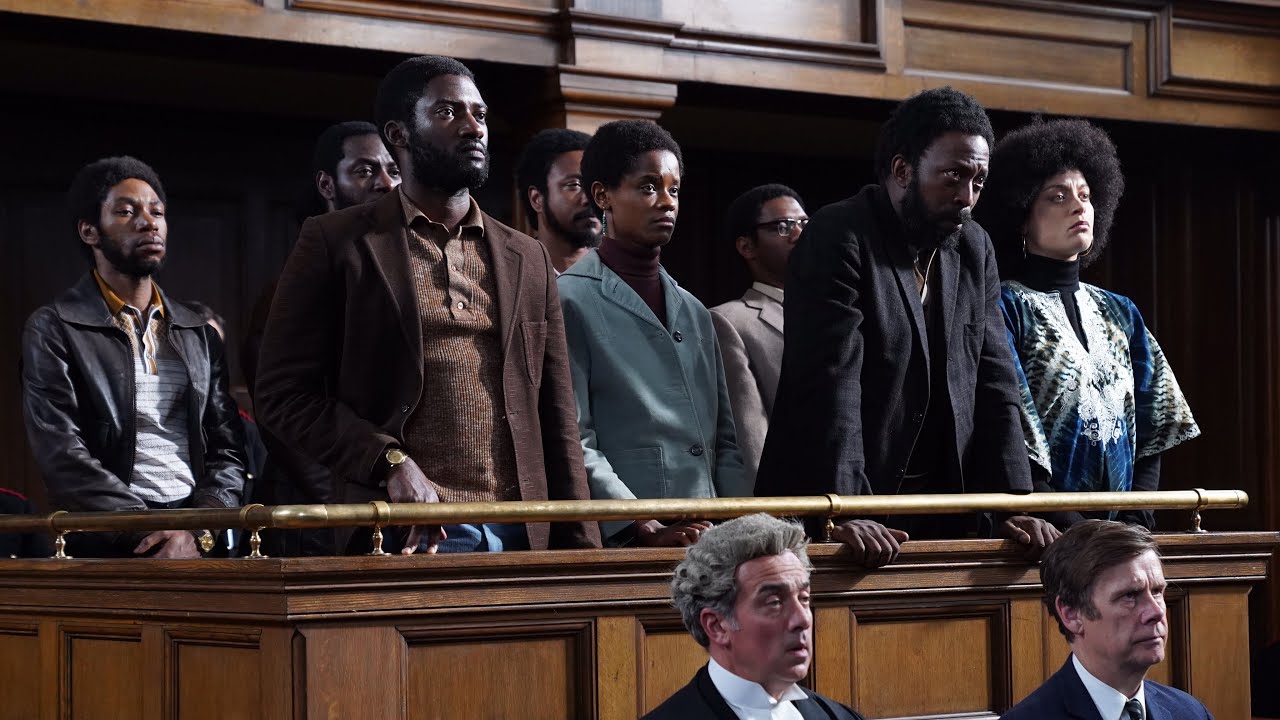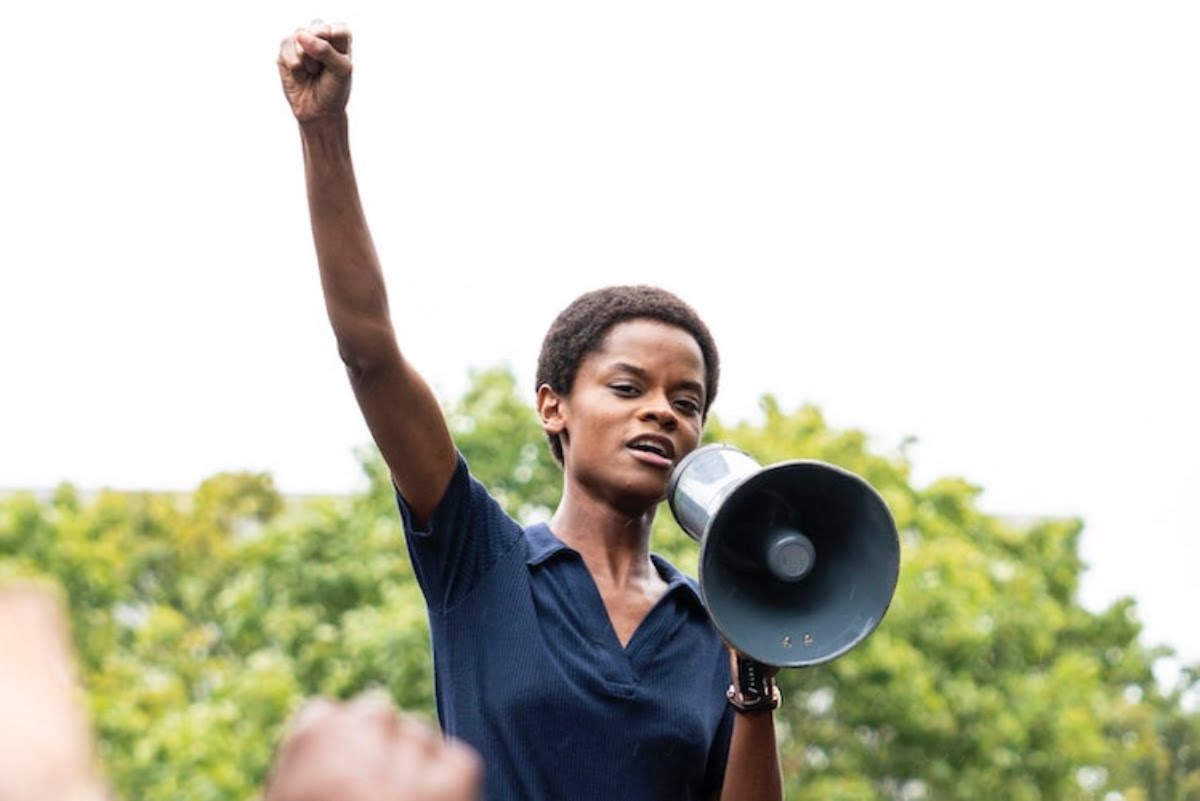In telling the story of the ‘Mangrove Nine’, Steve McQueen’s new BBC film highlights the struggle against racism, then and now. As the protagonist asserts: the system is rigged and rotten. We must rip up racism at its root – capitalism.
Mangrove is the first of a series of films by Steve McQueen called Small Axe, depicting black life in Britain over three decades from the 1960s to the 1980s.
This initial part of this BBC series tells the tale of the trial 50 years ago of the ‘Mangrove Nine’: a group of black British activists arrested for protesting against police brutality and harassment in their local community.
Radicalism and revolution
 The story of the Mangrove – a West Indian community restaurant at the centre of an iconic anti-racist struggle – starts in Notting Hill in 1968 with a celebration. On opening night, joy flows out onto All Saints Road as West Indian immigrants, old and young, dance and drink to the sound of kettle drums. The viewer is almost forgiven for forgetting the words ‘Powell for PM’ sprawled on a wall nearby.
The story of the Mangrove – a West Indian community restaurant at the centre of an iconic anti-racist struggle – starts in Notting Hill in 1968 with a celebration. On opening night, joy flows out onto All Saints Road as West Indian immigrants, old and young, dance and drink to the sound of kettle drums. The viewer is almost forgiven for forgetting the words ‘Powell for PM’ sprawled on a wall nearby.
Yet amidst the joy there is a resolute commitment to the struggle. Altheia Jones-Lecointe (played by Letitia Wright), leader of the British Black Panthers, makes the case for unionisation amongst South Asian factory workers. Elsewhere, the young activist Darcus Howe (Malachi Kirby) reads CLR James’ The Black Jacobins, the story of the Haitian Revolution.
With the revolutionary waves of 1968 against state repression, and with the black community still reeling from the high-profile murder of Kelso Cochrane, there is a strong current of militancy in the Caribbean community.
State machine
Within two years of opening, the restaurant has been raided by the police 12 times, based on spurious – and racist – accusations of drug-dealing and gambling. White police officers stream into the restaurant, wreaking destruction in the heart of the Caribbean community.
When Mangrove owner Frank Critchlow (Shaun Parkes) dares to take the issue to court, he receives a £25 court fine and is made to pay the legal fees of the police. “The police in cahoots with the council, the council with the damn judge, the judge with the police,” Critchlow asserts, commenting on the various arms of the same brutal state machine.
Tensions rise and spill out onto the streets on 9 August 1970. A demonstration organised by the local community, with the support of the British Black Panthers, marches to the local police station. Crowds carry banners and placards calling for “black power” and “hands off black people” – a message that still rings through the streets of London today.
The police wade into the melee. Bricks are thrown, batons raised and brought down with gleeful ferocity. Protestors are grabbed, pummeled, and arrested. Nine defendants find themselves facing charges of riot and affray.
Institutional racism
 With the palpable tension of Crichlow’s silent, seething rage, the law court’s hypocrisy is laid bare. The legal system – which was so kindly bestowed on Britain’s colonial subjects – bears all the hallmarks of bourgeois morality: justice and fairness in word, but not deed.
With the palpable tension of Crichlow’s silent, seething rage, the law court’s hypocrisy is laid bare. The legal system – which was so kindly bestowed on Britain’s colonial subjects – bears all the hallmarks of bourgeois morality: justice and fairness in word, but not deed.
The judge’s oppositional stance during the trial reflects the bankruptcy of the capitalist state in offering racial justice, or at least impartiality. However, by describing “racial hatred on both sides”, this was the first, albeit weak, recognition of racism in the police force.
The defendants are eventually acquitted of the charges, but the police will never apologise for their actions and for targeting the Mangrove.
29 years later, the Macpherson Report, produced after the murder of Stephen Lawrence, confirmed the Mangrove Nine’s main courtroom argument: racism in the police is not confined to a few individuals, but is endemic to the institution.
Solidarity and struggle
The anti-racist struggle in Britain has seen some change over the years. In the 1960s, to be black meant to be not white – a form of racial solidarity amongst ethnic minorities facing state oppression and far-right terror. Without digital platforms, protests were organised by word of mouth and community hubs like the Mangrove.
In truth, however, little has changed. Young black men are 10 times as likely to undergo stop-and-search by the police and other authorities. Just recently, a student at the University of Manchester was pinned against the wall and accused of being a drug dealer by university security staff.
The divisive and hateful ideology of racism – manufactured and distributed wholesale by the ruling class – translates into everyday suffering and harassment for many black people today. From Grenfell to Mercy Baguma: black lives remain dispensable under capitalism.
Rigged and rotten
The story of the Mangrove Nine belongs to the militant tradition of British radical movements, just the same as the Chartists. For the many Brits whose lineage extends beyond our borders, Critchlow’s words ring true: “this we home”, and we are here to stay.
Yet the solution to the ongoing scourge of racism does not lie in the atomisation and dilution of the struggle. Where Altheia called for the defendants to be “protagonists of our stories”, we must draw on the tactics of inter-racial solidarity and united class struggle.
Anti-racist groups during the time of the Mangrove Nine marched under banners of ‘Black and White, Unite and Fight!’ Black struggles must be brought to the fore. But it is the responsibility of the whole of the organised working class – regardless of race – to fight together to dismantle racism.
As Critchlow explains in one dramatic courtroom scene: “The system is rigged! The system is rotten!” We 100% agree. To end racism, we must rip it up at its root: the rigged and rotten capitalist system.






